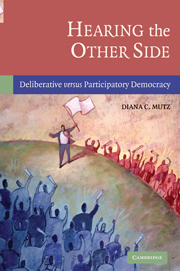Preface
Published online by Cambridge University Press: 05 June 2012
Summary
This is not the book I wanted to write. For this reason, among others, it has taken me much longer than I had anticipated to determine the real storyline. My hope is that my patience pays off, and in the end it rings truer to the world of real political experience as a result. It still does not, for better or worse, have the kind of neat and tidy ending that I originally sought. But in this case, that is probably as it should be because I believe the dilemma I describe has no easy solution. Nonetheless, it provides a distinct tension in American politics, one that remains largely neglected in both theory and empirical work.
After I gave up on my original book – a book evaluating the extent to which empirical evidence substantiates the claims of deliberative democratic theory – I remained bothered by the extent to which other scholars viewed my work on political networks as inconsistent, self-contradictory, and even schizophrenic. In particular, the empirical work featured in Chapters 3 and 4 of this book evoked this reaction. Technical details on these two studies can be found in articles published in the American Political Science Review and the American Journal of Political Science. Because these two pieces had seemingly contradictory things to say about the consequences of cross-cutting political networks for democratic well-being, many assumed that at least one of them (and maybe both) had gotten things wrong.
- Type
- Chapter
- Information
- Hearing the Other SideDeliberative versus Participatory Democracy, pp. ix - xiiPublisher: Cambridge University PressPrint publication year: 2006

